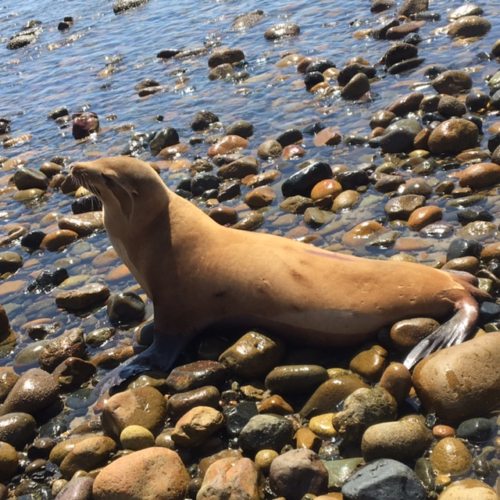While most of Laguna Canyon Foundation’s education programs are held amidst the beautiful coastal sage scrub landscape in the canyon, we do host a few field trips at Crystal Cove State Park‘s Reef Point tide pools.
Meeting the bus full of sixty fourth graders in the parking lot overlooking the beach, our trained Laguna Canyon Foundation educators debriefed both the adults and students about safety and caring for the delicate ecosystem before we headed to the shore. We learned not to remove anything and not to disturb the animals. We learned to walk slowly and carefully, keeping in mind that we are guests in these animals’ habitat. The eager children, their parents, and the teachers were excited to spend the morning on the beach.
Who wouldn’t love that?
So, imagine our surprise as we descended the dozens of stairs toward the sand to see a stranded sea lion on the very rocks and tide pools we were ready to explore. She bobbed and twisted her head slowly before lying still, her eyes closed. She didn’t look well, and the students, having just heard the rules of the tide pools, showed great respect for the animal. They kept their distance. The parents helped the educators guide the students around the sea lion’s area, going to tide pools further down the beach. One helpful parent took charge of 15 children while an educator texted Pacific Marine Mammal Center with a photo of the sea lion.
We continued our tide pool exploration, enjoying the sea air and observing hermit crabs, sea anemones, sea hares and many other amazing creatures, but most children focused their questions on the sea lion. “What’s wrong with her?” “What’s going to happen to her?” “Why is she so dry?” “Do we know if it’s a girl or boy?”
At that point, the educators didn’t have answers. What they could share, though, was that a great organization in the very canyon where we often hike, the Pacific Marine Mammal Center, was on their way to come rescue her and take care of her.
And that is what happened. Less than an hour later, the PMMC truck came driving down the sand and the fourth graders of Pio Pico Elementary got to witness, firsthand, a sea lion rescue.
That was April 18, 2017. The staff at Laguna Canyon Foundation visited Pacific Marine Mammal Center several times to see how the sea lion was doing. PMMC named her Betty Boop. She had domoic acid poisoning, which is caused by eating fish that have, themselves, fed on toxic algae blooms. These toxic algae blooms were caused by fertilizers and runoff from the rains earlier this year.
When we think of land and sea – greenbelt and bluebelt – it is easy to see how intertwined they are. What we do on land affects our oceans and vice versa. Particularly here, in Laguna Beach and Laguna Canyon, we can each make a big difference if we are responsible for how we dispose of chemicals, if we pick up trash on streets and on trails that would otherwise go into the ocean, and if we keep our distance and respect plant and animal life.
So, what happened to Betty Boop? We were nervous. The Orange County Register had reported that eight of 12 sea lions picked up during the early weeks of April had died, most showing signs of domoic acid poisoning.
It was with great relief that we heard from the PMMC technicians during one of our visits that Betty Boop was “a pistol.” She was eating on her own, acting very bossy and “ready to leave.”
After a few more days with PMMC, the staff was confident that she had a good chance to be back out on her own. With the staff eager not to keep her in captivity any longer than necessary, and with Betty Boop making it clear she wanted out, Betty Boop was released, healthy, on May 1, 2017.

